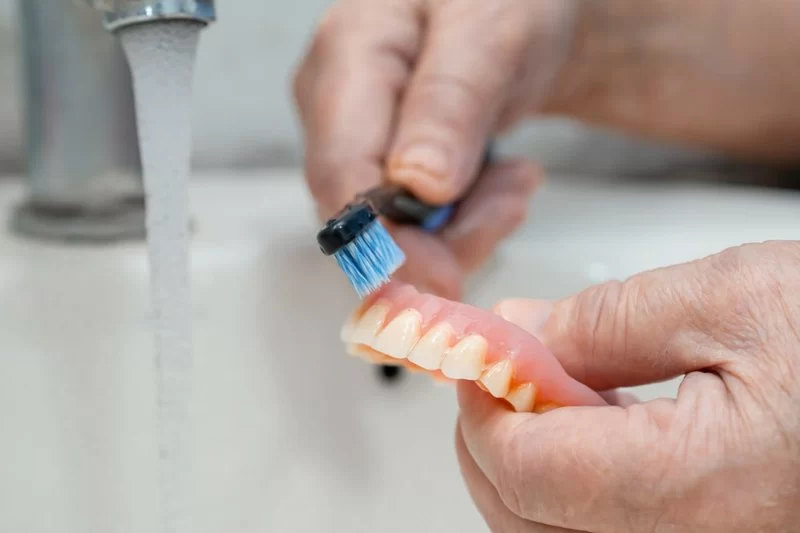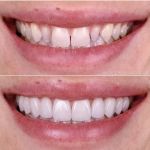
- 1-understanding-dental-prosthetics-and-the-importance-of-cleaning
- 2-daily-cleaning-routine-for-dental-prosthetics
- 3-deep-cleaning-methods-and-products
- 4-common-mistakes-to-avoid-when-cleaning-prosthetics
- 5-real-life-patient-experiences-and-success-stories
- 6-professional-care-and-maintenance-visits
- 7-why-family-dentistry-online-recommends-regular-denture-care
1. Understanding Dental Prosthetics and the Importance of Cleaning
Dental prosthetics—whether dentures, partials, bridges, or implant-supported devices—restore confidence, functionality, and aesthetics for millions of people worldwide. But even though these restorations replace natural teeth, they require the same level of attention and care. Learning how to clean dental prosthetics properly ensures that they remain fresh, hygienic, and long-lasting.
Food particles, plaque, and bacteria can accumulate on prosthetics just as they do on natural teeth. Without proper cleaning, this buildup can lead to bad breath, gum irritation, or even infections. A consistent hygiene routine not only extends the lifespan of your dental devices but also protects your overall oral health.
2. Daily Cleaning Routine for Dental Prosthetics
The cornerstone of dental prosthetic care is a consistent daily routine. Cleaning your prosthetics each day prevents staining and removes debris that could compromise fit or comfort. Here’s a recommended approach to follow at home:
1. Remove and Rinse After Meals
After eating, remove your dental prosthetics and rinse them under warm (not hot) water. This helps eliminate food particles and reduces bacterial buildup. Be sure to handle them gently to avoid dropping or damaging delicate components.
2. Brush with a Soft-Bristled Denture Brush
Use a specially designed denture brush or a soft toothbrush to clean the entire surface. Avoid regular toothpaste, which can be abrasive and scratch the material. Instead, use mild soap or a non-abrasive denture cleanser recommended by your dentist.
3. Soak Overnight
Most removable prosthetics need to stay moist to maintain their shape. Place them in a glass of water or denture-cleaning solution overnight. This not only keeps them hydrated but also kills lingering bacteria. Always rinse thoroughly before putting them back in your mouth the next morning.
3. Deep Cleaning Methods and Products
While daily cleaning is essential, occasional deep cleaning ensures that your prosthetics stay in pristine condition. Here are professional-grade and home-friendly methods to keep them at their best:
1. Effervescent Cleaning Tablets
These tablets, when dissolved in warm water, release cleansing bubbles that reach small crevices and remove tough stains. They’re especially effective for older prosthetics that may have minor discoloration or odor retention.
2. Ultrasonic Cleaners
Ultrasonic cleaning devices use sound waves to gently dislodge plaque and debris. Many dental professionals recommend using these once or twice a week for a deep cleanse. They’re safe, efficient, and provide thorough results without harsh scrubbing.
3. Professional Polishing
At regular dental checkups, your dentist can professionally polish your dental prosthetics to restore their natural shine. This process also helps detect early signs of wear, which, if left unchecked, could affect comfort and fit.
4. Common Mistakes to Avoid When Cleaning Prosthetics
Even well-intentioned cleaning habits can cause long-term damage if not done correctly. Avoid these common pitfalls when caring for your prosthetics:
1. Using Hot Water
Excessive heat can warp or weaken dental prosthetics, causing them to lose their proper fit. Always clean with lukewarm or cool water.
2. Harsh Cleaning Chemicals
Bleach or abrasive powders can discolor and corrode prosthetic materials. Stick to dental-approved cleansers or mild soap solutions.
3. Skipping Daily Cleaning
Leaving prosthetics uncleaned overnight allows bacteria to multiply rapidly, leading to unpleasant odors and potential gum irritation. Consistency is the key to freshness and hygiene.
5. Real-Life Patient Experiences and Success Stories
At Family Dentistry Online, many patients have discovered how small adjustments in their cleaning routines transformed their daily comfort. Take Robert, a retired engineer, who once struggled with persistent denture odor. After switching to an ultrasonic cleaner and regular overnight soaks, he noticed a dramatic improvement within a week.
Another example comes from Linda, who wore partial dentures for ten years. She learned that her habit of cleaning with toothpaste was dulling the surface. By using a mild soap and soft brush instead, her prosthetics regained their natural sheen and felt more comfortable against her gums. These stories show that small, informed changes can make a significant difference.
6. Professional Care and Maintenance Visits
Regular dental visits remain crucial even after receiving prosthetics. During these appointments, your dentist can assess the condition of both your prosthetics and your oral tissues. Adjustments may be needed to ensure proper alignment and avoid pressure sores.
Professional cleanings every six months help remove stubborn buildup that at-home methods may miss. These sessions also give patients the opportunity to discuss any discomfort or fit issues before they become major concerns.
7. Why Family Dentistry Online Recommends Regular Denture Care
At Family Dentistry Online, our dental specialists emphasize preventive care as the best way to extend the life of your prosthetics. We believe that understanding how to clean dental prosthetics correctly empowers patients to take control of their oral health. Clean prosthetics not only improve aesthetics but also contribute to fresher breath and healthier gums.
Our experts often remind patients that prosthetic care isn’t just about cleaning—it’s about confidence. A bright, comfortable smile improves communication, eating habits, and overall well-being. With the right guidance and products, maintaining that perfect smile becomes effortless.
Whether you use full dentures, partials, or implant-supported options, consistent cleaning and professional checkups ensure that your dental investment continues to deliver comfort and beauty for years to come.







 Lourdes's Dentistry - Affordable Dentist4.0 (160 review)
Lourdes's Dentistry - Affordable Dentist4.0 (160 review) Silc Periodontics4.0 (169 review)
Silc Periodontics4.0 (169 review) Doc Bresler's Cavity Busters4.0 (363 review)
Doc Bresler's Cavity Busters4.0 (363 review) McCall Family Dentistry5.0 (718 review)
McCall Family Dentistry5.0 (718 review) Justin Ewell, DMD at Suncoast Dental Goodyear0.0 (0 review)
Justin Ewell, DMD at Suncoast Dental Goodyear0.0 (0 review) Harbor Point Dental at Pelham Manor4.0 (118 review)
Harbor Point Dental at Pelham Manor4.0 (118 review) The Importance of Oral Health Education During Pregnancy for a Healthy Pregnancy
The Importance of Oral Health Education During Pregnancy for a Healthy Pregnancy Best Tips for Brushing Your Teeth Properly for Healthy Gums: Essential Techniques for Oral Health
Best Tips for Brushing Your Teeth Properly for Healthy Gums: Essential Techniques for Oral Health Why Skipping Dental Checkups Can Lead to Bigger Oral Health Problems
Why Skipping Dental Checkups Can Lead to Bigger Oral Health Problems Advantages of Porcelain Dental Restorations
Advantages of Porcelain Dental Restorations How Can Diabetes Cause Tooth and Gum Problems? Preventing and Managing Oral Health Issues
How Can Diabetes Cause Tooth and Gum Problems? Preventing and Managing Oral Health Issues Healthy Habits for Promoting Good Oral Health and Hygiene: Tips for a Healthy Smile
Healthy Habits for Promoting Good Oral Health and Hygiene: Tips for a Healthy Smile